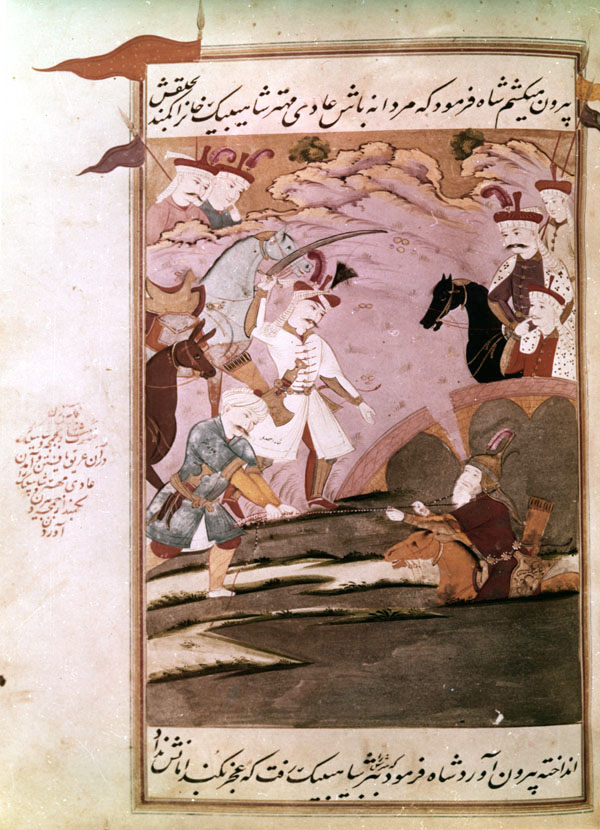Ādi Rescues Šāhibeg Ḵān From Drowning
The date of the event is 916/1510. According to the text, Ādi, the stableman of Šāhibeg Khan, rescued him from the river by lassoing him around the neck and pulling him out of the torrent, at which time Esmå¯il immediately ordered Šāhibeg decapitated. The painting, faithful to the text, depicts Šāhibeg with a disparaging look on his face, astride his horse in the lower right. A rope, looped around his neck, is being pulled taught by Ādi, who stands opposite him in the lower left. The river in which Šāhibeg is immersed, executed in silver and now tarnished to a dark gray, occupies the bottom third of the composition, above which is a mauve colored hill with a craggy rock outline at the top and a gold sky. Shah Esmāʿil, in a white coat with gold trim and a red tāj, stands at the very edge of the river bank with a sword raised over his head and staring at Šāhibeg in anticipation. Behind the shah is his horse and a mule. Five other Safavids observe the scene, three in the upper right, and two others peering over the rock ledge in the upper left.
There is a basic variance between the event here depicted, and the account of Šāhibeg’s demise as related by Eskandar Monshi. Monshi relates the following: the decisive battle of Maʿmudābād in the district of Marv in the year 916/1510 where many Uzbegs were killed, Šāhibeg Khan and a group of Uzbegs in their precipitate flight (see folio 135v), entered an enclosed area which had no escape route. There they piled one upon the other in a bog (here depicted as a river), only to perish miserably. The corpse of Šāhibeg Khan was discovered, according to Monshi, beneath a pile of dead bodies by one of the Bozčalu ḡāzis, ʿAziz Āqā by name, known as Ādi Bahādor (a remarkable resemblance to Ādi the stableman). The head was separated from the body and flung under the hooves of Esmāʿil’s horse, while the various body parts were each sent to a different province (see f.217).
Location: Reza Abbasi Museum, Tehran, No.77.1.7, folio 210
Painting: 22.5 x 15.4 cm. Dimensions after Mahboubian catalog; No marginal inscription. A marginal inscription in red describes the event depicted. Inscriptions in black, are written on three of the figures, identifying them as šāhibeg ḵān, šāh esmāʿil, and ādi the stableman.
Painting references:
Mahboubian_1972, #923 folio 210 (not ill.).
Text references:
See Muntaẓer-Ṣāḥeb_1970, p.369 for this event in the History of Shah Esmāʿil.
See Savory, SA_1979, p.62 for this event in the History of Shah ʿĀbbās.
Robert Eng
Last Updated: Dec. 19, 2011 | Previous update: Dec. 15, 2010 | Originally published: April 4, 2002
